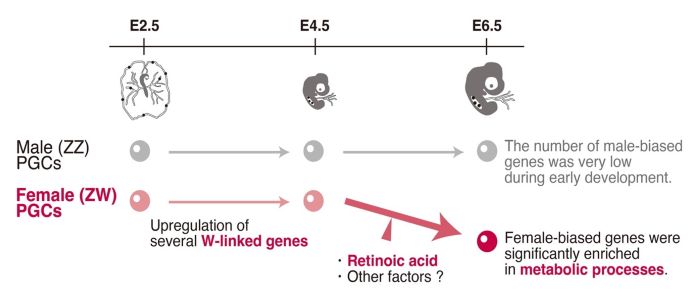E-mail: pr-research*office.hiroshima-u.ac.jp (Please replace * with @)
Researchers study sex-determination in birds using primordial germ cells and RNA-sequencing analysis

Female-specific potential processes and pathways were identified in chicken primordial germ cells (PGCs) derived from early embryos. (Kennosuke Ichikawa/Genome Editing Innovation Center)
Scientists have known that sex-determination in vertebrates happens in the germ cells, a body’s reproductive cells, and the somatic cells, the cells that are not reproductive cells. Yet they have not fully understood the mechanisms by which it happens. To better grasp the process of the germ cell’s sex determination, a research team has analyzed germ cells in chickens using RNA-sequencing to predict the mechanism that determines the sex. Their study provides insight into the mechanism of sex determination in birds.
The Hiroshima University research team published their findings in the journal Scientific Reports, a Nature publication, on August 17, 2022.
“While previous studies have demonstrated that chicken primordial germ cells possess a characteristic feature in sex determination, its mechanism remains unclear. To solve this challenge, we revealed gene expression profiles of male and female primordial germ cells derived from early chick embryos and then predicted the sex determination mechanism,” said Kennosuke Ichikawa, a postdoctoral researcher at the Genome Editing Innovation Center, Hiroshima University. This research is the first to predict the sex-determination mechanism by comparing the gene expression profiles of avian primordial germ cells at each embryonic stage, as well as by using a stimulation test.
Birds have unique mechanisms of sex determination, that are different from mammals. In mammals, which have an XX (female) — XY (male) sex chromosome system, their sex determination depends on the action of the Y-chromosome. In birds, which have a ZZ (male) – ZW (female) sex chromosome system, their sex depends on the action of the Z chromosome. Yet the molecular mechanism of sex determination remains unclear. The development of the reproductive glands called gonads, into either ovaries or testes, and the development of other sexual characteristics are at least partially cell autonomous. The researchers’ investigation of the sex-determination mechanism in birds provides them insight into the evolution of vertebrate sex-determining mechanisms.
To investigate the mechanisms underlying sex determination in avian germ cells, the team purified male and female primordial germ cells from the blood and the gonads, using fluorescence-activated cell sorting. With this process they achieved a purity of greater than 96 percent. They determined gene expression profiles of the primordial germ cells at each developmental stage for each sex using RNA-sequencing analysis, where next-generation sequencing is used to examine the quantity and sequences of RNA in a sample. Then, the researchers predicted the sex-determination mechanism of the primordial germ cells using bioinformatic analysis, where computer tools are used to understand biological data. To evaluate the prediction, they stimulated male primordial germ cells with retinoic acid in vitro, and examined the changes in gene expression.
Before settling in the gonads, the female circulating primordial germ cells obtained from blood displayed sex-biased expression. The primordial germ cells from the gonads also exhibited sex-biased expression, and the number of female-biased genes detected was higher than that of male-biased genes. The team realized that the female-biased genes in the primordial germ cells were enriched in some metabolic processes. To reveal the mechanisms underlying this process, the researchers performed stimulation tests.
The team used retinoic acid to stimulate the cultured primordial germ cells collected from male embryos. This stimulation resulted in the upregulation – the process where a cell’s components increase – of several female-biased genes. Overall, their results suggest that sex determination in avian primordial germ cells involves aspects of both cell-autonomous and somatic-cell regulation. Moreover, it appears that sex determination occurs earlier in females than in males.
“We successfully predicted female-specific potential processes and pathways in chicken primordial germ cells. We believe our data set can significantly contribute to elucidating the avian sex determination mechanism,” said Ichikawa.
Looking ahead to future work, the team plans to use the data set to identify the key molecules directly inducing the feminization of chicken primordial germ cells. “The ultimate goal of this study is to elucidate the sex determination mechanism and then establish a sex selection method in chickens using genome editing targeting the key molecules,” said Ichikawa.
The Hiroshima University research team includes Kennosuke Ichikawa, Yoshiaki Nakamura, Hidemasa Bono, Ryo Ezaki, Mei Matsuzaki, and Hiroyuki Horiuchi. The research is funded by the Japan Society for the Promotion of Science KAKENHI.
About the study
Journal: Scientific Reports
Title: Prediction of sex-determination mechanisms in avian primordial germ cells using RNA-seq analysis
Authors: Kennosuke Ichikawa, Yoshiaki Nakamura, Hidemasa Bono, Ryo Ezaki, Mei Matsuzaki & Hiroyuki Horiuchi
DOI: 10.1038/s41598-022-17726-7
Norifumi Miyokawa
Office of Research and Academia-Government-Community Collaboration, Hiroshima University

 Home
Home














